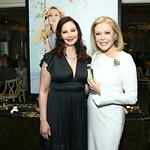By Elizabeth Willoughby on
In Ashley Judd's frank and powerful TED talk that she gave in January, the actress called out online harassment and the culprits who perpetuate it.
Sharing many of the degrading, violent tweets and Facebook posts that she receives every day, she calls online misogyny a global gender rights tragedy, and demands an end to it so that freedom can fill that space.
On dealing with a daily onslaught of social media abuse, she says, “I’ve tried to rise above it, I’ve tried to get in the trenches, but mostly I would scroll through these social media platforms with one eye partially closed, trying not to see it, but you can’t make a cucumber out of a pickle. What is seen goes in. It’s traumatic. And I was always secretly hoping in some part of me that what was being said to me and about me wasn’t … true. Because even I, an avowed, self-declared feminist, who worships at the altar of Gloria, internalize the patriarchy. This is really critical. Patriarchy is not boys and men. It is a system in which we all participate, including me.”
On one particular day, one of her tweets during a basketball game triggered a cyber mob, where besides the usual vitriol she also received rape threats and death threats. “When I was sitting at home alone in my nightgown,” she says, “I got a phone call, and it was my beloved former husband, and he said on a voice mail, ‘Loved one, what is happening to you is not OK.’ There was something about him taking a stand for me that night that allowed me to take a stand for myself.”
One of the ways she has done that was to co-create WMC Speech Project an online resource to raise public and media awareness about online harassment, as well as serving as an information resource with tools, research, statistics and “Online Abuses 101”.
In her talk Judd also calls out sexism in workplaces, tech companies that create misogynist video games, law enforcement, outdated legislation, and white men who do not disrupt gender violence.
“Every single day online misogyny is a phenomenon endured by us all, all over the world, and when it is intersectional, it is worse,” says Judd. “Sexual orientation, gender identity, race, ethnicity, religion — you name it, it amplifies the violence endured by girls and women, and for our younger girls, it is worse. […] We must as individuals disrupt gender violence as it is happening. We must have the courage and urgency to practice stopping it as it is unfolding. And lastly, believe her. Believe her.”
Copyright © 2017 Look to the Stars






